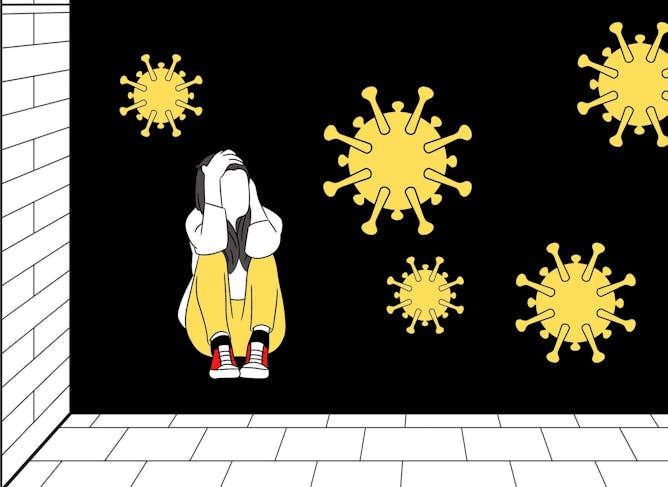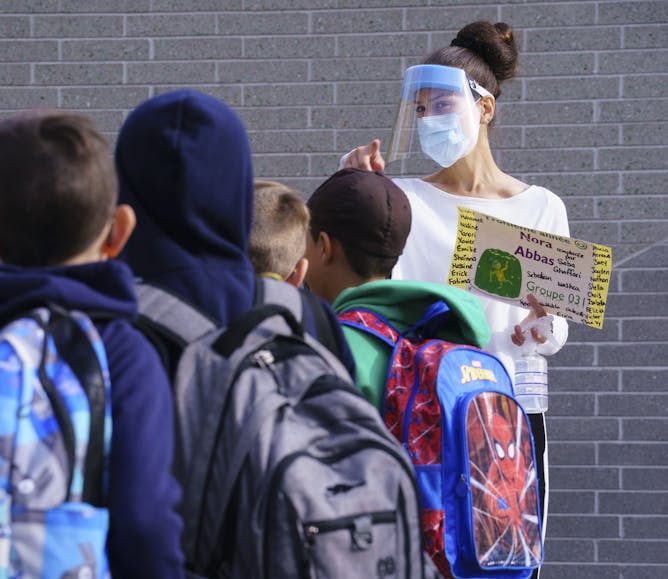|
The COVID-19 pandemic has had a major impact on mental health, especially for younger people. There are now several vaccines to prevent COVID-19, but no prevention plan to address this parallel pandemic.
Today in The Conversation Canada, Renée El-Gabalawy and Jordana Sommer of the University of Manitoba explain why we need a mental health “vaccine.” Their research found that more than a third of young adults are experiencing anxiety during the pandemic. An early intervention strategy to lower the risk of progression to serious mental illness should be a priority.
Also today:
Regards,
|

Early evidence suggests that younger people are at the highest risk of poor mental health outcomes from the COVID-19 pandemic.
(Canva)
Renée El-Gabalawy, University of Manitoba; Jordana Sommer, University of Manitoba
The mental health effects of the pandemic will likely outlive COVID-19. The goal should be to target mental health symptoms early in order to decrease major long-term effects.
|

A child stands near a large screen showing photos of Chinese President Xi Jinping near a carpark in Kashgar in western China’s Xinjiang region.
(AP Photo/Ng Han Guan)
Reza Hasmath, University of Alberta
Rights-based pressure on China over its treatment of Uyghurs is necessary, but other nations could also present best practices for the ethical treatment of racialized minorities in their own countries.
|

A holistic approach to growing children’s vocabulary could mean reading children stories about bears from fairy tales, science books and the news.
(Shutterstock)
Hetty Roessingh, University of Calgary
One way to help children learn the words they need to thrive academically is by reading aloud from books and news sources that use both narrative and expository writing.
|

Schizophrenia has been identified as a significant risk factor for dying of COVID-19.
(Canva)
Kaleigh Alkenbrack, University of Toronto
People with schizophrenia are almost three times more likely to die from COVID-19 than those without the serious mental illness, making it second only to age as a risk factor for mortality.
|

A bluestreak cleaner wrasse in an aquarium.
(Shutterstock)
Benjamin Whittaker, University of Guelph; Elizabeth Boulding, University of Guelph
Cleaner fish feed on the parasites that live on other fish. Studying communication between cleaner fish and their clients may help employ them in salmon farms, which can be plagued by parasites.
|

Une enseignante portant un équipement de protection accueille ses élèves dans la cour d'école de l'école primaire Philippe-Labarre à Montréal, en août 2020. Les nombreuses mesures sanitaires ajoutent au stress vécu par les enseignants depuis le début de la pandémie.
La Presse Canadienne/Paul Chiasson
Carla Barroso da Costa, Université du Québec à Montréal (UQAM); Alioum Alioum, Université de Montréal; Elisabeth Doyon, Université du Québec à Montréal (UQAM); Nathalie Loye, Université de Montréal
Stress, fatigue, angoisse et irritabilité : les enseignants du primaire et du secondaire sont passés par toute une gamme d’émotions depuis le début de la pandémie.
|

Le sexe peut contribuer au bien-être psychologique, mental, émotionnel et physique d’une personne.
Shutterstock
Yuliya Rackal, University of Toronto
Les relations sexuelles ont de nombreux bienfaits psychologiques. Mais pendant la pandémie, alors que la résilience est précieuse, les Canadiens ont moins de relations sexuelles, pas plus.
|
Arts
|
-
Ewa Hanna Mazierska, University of Central Lancashire
From festivals to awards, generating buzz can increase the gross earnings of a film and even increase investment in a country's film industry.
|
|
Environment + Energy
|
-
Andy Pitman, UNSW; Anna Ukkola, UNSW; Seth Westra
In any given year, there's a 1% chance of a 'once in a century' flood. But that doesn't mean they can't happen more than once in quick succession.
|
|
Science + Technology
|
-
Harry Cliff, University of Cambridge; Konstantinos Alexandros Petridis, University of Bristol; Paula Alvarez Cartelle, University of Cambridge
If the finding really is the result of new fundamental particles then it will finally be the breakthrough that physicists have been yearning for for decades.
|
|